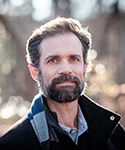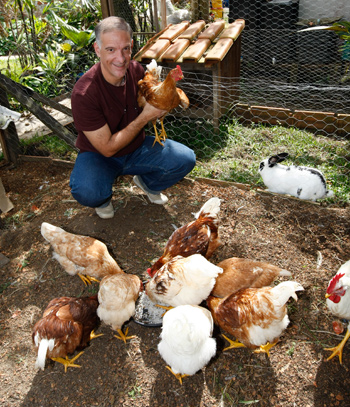Editor’s note: In this excerpt from “Making Peace with the Land: God’s Call to Reconcile with Creation” (written with theologian Norman Wirzba), Fred Bahnson asks: “What if our homes and churches went from being primarily sites of consumption to places of production?”
A few years ago Brazilian pastor Claudio Oliver and a group of his friends were so attracted to the vision of God’s abundance they’d read about in Scripture that they decided to go for it. Several of them quit their jobs and began an experiment in kingdom-centered community in Curitiba, Brazil. They called it Casa da Videira, which means Home of the Vine, “a cooperative of families that have decided to create a vibrant, sustainable place in which to live a balanced, relationally-focused life, caring for God’s creation and inspiring the people around them.” What that looks like might best be called “abundant kingdom homesteading.”
They are involved in urban food production, both gardening and with animals. They make and sell soap from recycled vegetable oil. It has been financially difficult for them to completely leave the abundant mirage of the industrial food system, and some of them still work in traditional jobs. Making an income is a constant struggle. Yet it’s also clear that they have found much joy to share in this kingdom experiment.
“We understand that we can’t think about food without referring to the narrative of creation and linking it with a deep understanding of how we have been created to be the bearers of the Spirit and part of the community of life on this planet, not its owners,” Claudio said.
They try to make eating an act within the cycle of life, not simply an act of consumption. For the folks at Casa da Videira, that means turning their attention to the dejected and rejected -- the leftovers. As Christians living in the city, their main concern is how the relationship with food in the city reveals our neglect of creation. “Every day,” says Claudio, “tons of nutrients arrive, are delivered, cooked in the city, and more than 30 percent of it is wasted.”
So each day Claudio and his friends collect some of that food waste. In a two-mile radius from home they collect vegetable scraps from grocery stores, food scraps and leftovers from neighbors, lawn clippings, wood chips, and leaves from the curb, and coffee grounds from coffee shops: three to four tons of organic garbage a month -- the refuse of roughly 150 households. They then compost it all in a backyard measuring less than a tenth of an acre, turning it into beautiful soil.
They raise 15 different heirloom varieties of chickens, who “help us remember the variety of creation,” and who eat as they did “in grandma’s time” -- feasting on food scraps, greens, corn, and worms provided by the composting program. Feeding the chickens worms for protein means that they don’t have to feed them soybeans, which is one of Brazil’s most destructive monocrops. Sixty-eight percent of Brazil’s crops, including soybeans, are now genetically modified, so choosing not to use soy is a small act of resistance against the abundant mirage of the industrial food system. The wood chips are used for the chickens’ bedding, and the chickens provide them with a good number of eggs every day. The roosters get eaten when they start “singing.” Four goats provide milk and cheese when they are in kid season, and the 30 rabbits are a major source of the community’s meat. The goats’ and rabbits’ urine and manure become part of the compost mix. This whole nutrient cycle ends in their “lasagna” bed garden, where they produce around three tons of organic vegetables per year for themselves and their neighbors.
But food production is only part of community life at Casa da Videira. Every day three or four families have one meal together: two university teachers, two housewives, one doctor, children, and friends have “a happy meal (the real one)” every day, sometimes with 18 different vegetables.
In Portuguese, Claudio explains, there are two terms for food: comida and alimento. “I always say, alimento is what McDonald’s and nutritionism gives to you; comida is what your mum makes for you.” Alimento is the amount of daily nutrients you need to stay on your feet, “where you work like a chicken in an ‘egg factory’ in order to make money to buy more alimento.” Comida, though, is what we Americans would call “soul food.” Here’s how Claudio describes the complex goodness that happens around comida:
“It’s a family together, people talking, warm fresh veggies, sweet potatoes with brown sugar and cinnamon in the morning (for Southerners in your country), corn bread, laughing, crying, prayer, thanksgiving, culture, old histories, yesterday morning histories, little ones learning who we are through food, love, fights, reconciliation, dating, a baby’s first meal, planning next lunch or tomorrow’s dinner. This one hour of LIFE is about remembering who and whose we are, from where we come, memories to help us cross difficult times with hope … well … this is comida.”
At Casa da Videira their daily practice is based on the promise in John 10:10: “I have come that they may have life, and have it to the full.” Claudio refers to the Greek word zoe, which comes from zao (dzah'-o) and means I live or I am alive.
“Zoe is what it’s like to feel alive. So we understand that what Jesus offers for us is this sensation of being alive, enjoying life, living abundantly. All this starts when we look to those pieces of life, sent to die as garbage, and reintroduce them into the cycle of life, respecting them as part of creation. It’s a process that begins in the soil and ends at our tables. We harvest our veggies from this cycle; we breed our animals inside of it; we even kill them the kosher way because we don’t want them being treated as commodities but as someone that give their lives for us to stay alive. Where the world sees garbage, we see nourishment; where the world sees death, we see life; in a world of loneliness, we discover community.”
In the years ahead I believe that the church will need the computer programmers and lawyers and economists to direct their creativity toward projects like Claudio’s, things like permaculture, biointensive gardening, and natural systems agriculture. In a world of diminishing fossil fuels, climate disruption, sick bodies, and eroding topsoil, a lot more of us are going to need to put our minds and shovels to work learning how to feed ourselves and our neighbors.
The picture before us is only bleak if we insist that the scaffolding of our current way of life will somehow hold. We need only transfer our hope away from that shaky structure and return it to our firm foundation, the One who has become the chief cornerstone, the One whose yoke is easy and whose burden is light, the One in whom all things were created and deemed “very good.” We need only imagine the abundant way of life our Lord invites us into, and then begin living as if that were true.
What if our homes and churches went from being primarily sites of consumption to places of production, as the scholar and priest Ivan Illich, one of Claudio’s heroes, suggested? What if we planted church-supported community gardens, permaculture parishes, transition churches, and apostolic farms that fed entire neighborhoods? What if seminaries trained every future pastor in the agrarian arts, ecological literacy, and sunshine-powered living? What if church lawns stopped being dumping grounds for pesticides and petro-fertilizers and started growing zucchini and heirloom tomatoes for the local homeless shelter? What if bishops and deacons and divinity school deans, and even the local church finance committee, took the church’s money out of the abundant mirage called "the economy" and put it into the much saner, more lasting savings account called soil fertility? What if we created infrastructures of holiness, where God’s kingdom of shalom could flourish, on earth as in heaven?
Everything I’ve been saying comes down to this unasked question: how much shalom can we expect to see this side of the eschaton?
I don’t have the answer. I do know that, living as we do in the abundant mirage, we haven’t expected nearly enough.
Soil-tenders like Claudio Oliver have expected God’s abundant kingdom because they have been looking for it. They have tried to live it, and in living as if the abundant kingdom were real, they have been given a glimpse. They’ve seen God’s shalom caress their land like a lover caressing his beloved’s cheek, though what they’ve seen has been fragile and small and mostly hidden, not something that easily fits on a goals-and-outcomes report or a press release or a Twitter-feed. That’s because God’s shalom is a wily and mysterious creature, shy and elusive around the world’s probing gaze, but one that lifts its head whenever we treat the land and those who dwell on it with care.
Taken from “Making Peace with the Land: God’s Call to Reconcile with Creation” by Fred Bahnson and Norman Wirzba. Copyright(c) 2012. Used by permission of InterVarsity Press, PO Box 1400, Downers Grove, IL 60515. www.ivpress.com.








